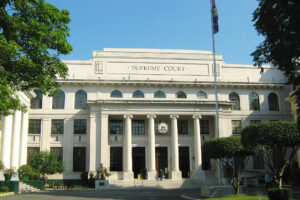THE SUPREME Court (SC) has ordered the country’s anti-graft court and the Presidential Commission on Good Government (PCGG) to release the shares of a company linked to the late dictator Ferdinand E. Marcos’ brother-in-law.
In a 17-page decision on July 6 and made public on Sept. 21, the SC First Division ruled that the Sandiganbayan can no longer hold Trans Middle East Equities, Inc. Philippines (TMEE) shares without valid cause, citing previous rulings that favored the TMEE.
“As the registered owner of the shares, TMEE cannot be deprived of its property without due process of law,” according to the ruling penned by Associate Justice Rodil V. Zalameda.
“In this case, there is no clear determination from appropriate judicial proceedings declaring the shares of stock as ill-gotten.”
In 1986, the PCGG sequestered 6,119,067 shares registered in the name of TMEE, which the agency said was owned by the late former Leyte Governor Benjamin T. Romualdez.
Sequestration places properties under an entity’s control to prevent destruction and concealment during pending judicial proceedings of determining ill-gotten wealth, the court noted.
The High Court said that the PCGG failed to prove that TMEE along with its shares of stock, was part of the ill-gotten wealth of Mr. Romualdez.
The agency argued that shares of common stock in Equitable-PCI Bank were illegally amassed by Mr. Romualdez during the 20-year reign of the late dictator.
The late governor is the brother of former First Lady Imelda R. Marcos.
The Philippine government and the First Philippine Holdings Corp. (FPHC) filed separate complaints to the Court of Appeals that sought to recover the shares obtained through ill-gotten wealth.
FPHC had previously owned the shares of stock in PCI Bank, which became Equitable PCI Bank and is now under BDO Unibank, Inc.
In 1984, the FPHC sold the shares of stock in PCI Bank to TMEE.
The Sandiganbayan had dismissed a complaint that alleged that the firm’s shares were part of the supposed ill-gotten wealth of the late governor.
The PCGG filed an ill-gotten wealth case against Mr. Romualdez the following year; however, TMEE was not named as a party to the case.
More than a decade later, the PCGG impleaded the firm as one of the defendants.
The anti-graft court Sandiganbayan previously ordered that the shares of stock and its proceeds be deposited in escrow at the Land Bank of the Philippines.
The late former President Corazon C. Aquino created the PCGG in 1986 to go after the ill-gotten assets of Mr. Marcos.
A popular street uprising toppled the dictator’s regime in February 1986, forcing him and his family to flee into exile in the United States.
“In resolving issues pertaining to sequestration, we must always bear in mind the constitutional right to due process of law,” the High Court said. — John Victor D. Ordoñez
